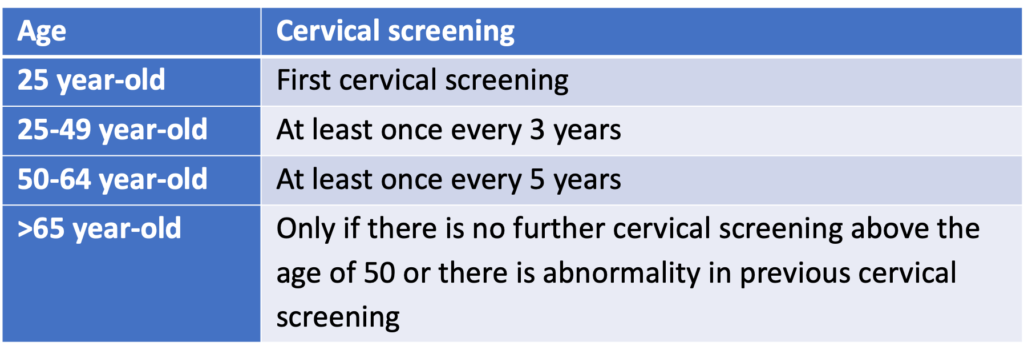SHARES

Since 1987, cervical cancer screening has successfully reduced the incidence of cervical cancer. Majority of the developed countries have regular nation-wide screening programme, offering regular screening for girls and women between the age of 25 to 65.
What is cervical cancer?
The Cervix is located at the distal end (bottom) of the uterus (womb). Cervical cancer is the abnormal cell growth over the cervix.
Is cervical cancer common?
Based on 2018 statistics, cervical cancer is the 4th commonest cancer among women in Malaysian, and comprises 7.7% of all female cancers. Most of the cervical cancer patients do not have regular cervical screening previously.
What causes cervical cancer?
Human Papilloma Virus (HPV) is the main cause of cervical cancer.
What is the human papilloma virus (HPV)?
The transmission mode of Human Papilloma Virus (HPV) virus is via skin contact and through sexual contact such as vaginal, anal and oral sex. There are more than 100 types of HPV. Low risk HPV includes HPV 6, 11, 42, 43, 44, 81 etc. They cause more than 90% of genital warts.
High risk HPV includes HPV 16, 18, 31, 33, 35, 39, 45, 51, 52, 53, 56, 58, 59, 66, 68 etc. These high-risk HPV may cause cervical cancer, anal cancer, vulva cancer and vaginal cancer.
How many cancer cases are due to the Human Papilloma Virus?
The current data suggests that 5% of the newly diagnosed total cancer cases worldwide is due to HPV.
However specifically for these cancers, HPV causes a high incidence:
- 99% of cervical cancer
- 85% – 91% of anal cancer
- 70% – 78% of vaginal cancer
- ~30% of vulvar cancer
Is Human Papilloma Virus common?
Human Papilloma Virus is a sexually transmitted infection to which the majority of the population has exposure to. As a result, for every 2 sexually active adults, 1 of them will have exposure to HPV.
What are the symptoms of a HPV infection?
During the initial phase, the majority will not have any symptoms. In fact, a healthy body immune system may clear the infection naturally. In the case of persistent infections, genital warts may develop due to low risk HPV infections while cancer may develop years later by high risk HPV infections.
How can I detect a HPV infection?
The current cervical screening (liquid cytology) can provide HPV genotyping. It can determine the type of virus before any change to the cervical cells take place.
What shall I do if I test positive for Human Papilloma Virus?
The presence of HPV does not mean it will lead to the development of cervical cancer. However, when mild cervical cellular changes occur, such as low grade squamous intraepithelial lesions, with the presence of the virus too, it means that one will need further investigation such as colposcopy. Thus regular cervical screening is an important part of the prevention strategy, in addition to vaccination.
Furthermore, current research data suggests that HPV vaccination can boost the body’s immune response and may even help clear existing HPV infections.
Are there any symptoms for cervical cancer?
Cervical cancer at its early stage normally does not have any symptoms. When the disease is more advanced, commonly reported symptoms include abnormal vaginal bleeding (post-coital bleeding, inter-menstrual bleeding; post-menopausal bleeding); abnormal vaginal discharges; pelvic pain or painful intercourse.
How can I prevent cervical cancer?
Currently there are 2 ways to prevent cervical cancer.
Prior to the availability of vaccination, the main method of prevention is cervical cancer screening. It can detect pre-cancerous changes and allows early initiation of treatment.
HPV vaccination on the other hand can prevent HPV infections. The current vaccine is able to provide protection for 9 types of HPV) namely HPV6, 11, 16, 18, 31, 33, 45, 52, 58.
To summarise, HPV vaccinations do not substitute for regular cervical cancer screening, in addition regular PAP smears are still your best protection against cervical cancer.
What is cervical screening?
During cervical screening, your doctor will brush off some cells from your cervix. These cells then go to the lab for the cytologist to examine for any abnormal changes. The lab can also use the sample cells for Human Papilloma Virus (HPV) genotyping.
How can I arrange for cervical screening?
Generally, most of the general practitioner clinics and all gynaecology specialist clinic offer cervical screening. It can be performed in under 10 minutes in the clinics.
When can I arrange for cervical screening?
Cervical screening is normally carried out when the lady is not pregnant or menstruating at the point of test. If there is any ongoing infection noted during the examination, generally the screening test will be deferred until such infection is treated.
When shall I start doing cervical screening?
When can I start vaccination for HPV?
Currently the 9-valent vaccination is recommended for:
Age 9-45: to prevent HPV related cervical cancer, vulva cancer, vaginal cancer and genital warts
Age 9-26: to prevent HPV related anal cancer
How many injections do I need for HPV vaccination?
Human Papilloma Virus (HPV) vaccination requires 3 injections.
The second injection is normally 2 months after the first injection.
The third injection is normally 6 months after the first injection.
Are all the HPV vaccinations the same?
Currently there are 3 types of HPV vaccines in Malaysia, Singapore & Thailand and generally available in most countries.
First generation is Cervarix (GlaxoSmithKline); also known as 2-valent vaccination, is effective against HPV16, 18.
The second generation is Gardasil (Merck Sharp & Dohme); also known as 4-valent vaccination, is effective against HPV6, 11, 16, 18.
For now, the latest vaccine in the market is Gardasil-9 (Merck Sharp & Dohme); also known as 9-valent vaccination, vaccinates against HPV6, 11, 16, 18, 31, 33, 45, 52, 58.
Do I need the 9-valent vaccination if I have previously had 2-valent or 4-valent vaccination?
2-valent vaccination is effective against HPV16, 18.
4-valent vaccination is effective against HPV6, 11, 16, 18.
The current 9-valent vaccination is effective against HPV6, 11, 16, 18, 31, 33, 45, 52, 58. Therefore , if you need protection against the extra strains, you will need the whole course of this latest vaccine again.
Can I get HPV vaccination during pregnancy?
Currently it is not advisable to receive the HPV vaccination during pregnancy. However, this does not mean that such vaccination is harmful to the mother or baby. The recommendation is merely due to the lack of data confirming it is safe to use during pregnancy. From animal studies thus far, there are no reports showing any detrimental effect to the fetus.
Is the HPV vaccination safe for breast-feeding mothers?
This vaccine is safe to use among breast-feeding mothers.
Acknowledgement: We thank Dr Tan Cheng, the author for contributing this article.
 |
Dr Tan ChengMBChB (Bristol, UK), MRCOG (London, UK) Obstetrician & Gynaecologist Tung Shin Hospital |
References:
- Alemany L et.al. Human papillomavirus DNA prevalence and type distribution in anal carcinomas worldwide. Int J Cancer. 2015;136(1):98-107
- Alemany L et.al. Large contribution of human papillomavirus in in vaginal neoplastic lesions: a worldwide study in 597 samples. Eur J Cancer. 2014;50(16):2846-2854
- Centers for Diseases – Sexually Transmitted Diseases Treatment Guidelines, 2010, Retrieved from https://www.cdc.gov/hpv/index.html
- De Sanjose S et.al. HPV genotype attribution in invasive cervical cancer: a retrospective cross sectional worldwide study. Lancet Oncol. 2010; 11(11):1048-1056
- De Sanjose S et.al. Worldwide human papillomavirus genotype attribution in over 2000 cases of intraepithelial and invasive lesions of the vulva. Eur J Cancer. 2013;49(16):3450-3461
- GLOBOCAN 2018. Global Cancer Statistics 2018. Retrieved from http://gco.iarc.fr
- NHSCSP Guidelines no. 20 (3rd edition), Colposcopy and Programme Management: Guidelines for the NHS Cervical Screening Programme; Public Health England
- Retrieved from https://pixabay.com/
Tags
by GetDoc Team
View all articles by GetDoc Team.









